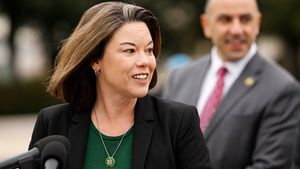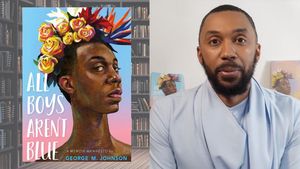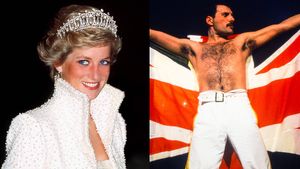Photo by Frankie C
Since the news was announced two weeks ago that writer Michael Musto was to be let go from Village Voice, where he has been a columnist and contributor since 1984, it has meant a whirlwind of changes. "This week alone I was on the finale of Smash, I was the bartender on Andy Cohen's "Watch What Happens Live," I was in "Page Six," the New York Times is following me around for a profile," he explained this week, sounding quite optimistic about the turn of events. Starting Monday, June 3, Musto's new column, "Musto! The Musical!" (yes, with TWO exclamation points), will be published on Out.com. He will also work on a regular column for The Advocate.
As many readers already know, Musto has been contributor to Out for quite some time, receiving attention in a groundbreaking essay, "The Glass Closet" (he later followed it up in 2011 with "The Glass Closet, Revisited"). With all the changes in his life and career, we wanted to find out what kept him going out night after night, what it was like documenting the happiness and horrors of the scene, and why he posed nearly naked as Lindsay Lohan on the cover of the Village Voice a few years back.
Out: After almost 30 years, what's it like no longer being associated with the newspaper and brand you've been a part of for most of your life?
Michael Musto: It was initially very weird, my whole heart and soul was tied into that job for so long, it had become my identity. Michael Musto and Village Voice were synonymous with each other. But things happen so quickly these days that once the advance word had leaked out that I was one of the people on the chopping block for a layoff, people started reaching out to me for new opportunities.
By the time I was called in and laid off, I already knew I had a very bright future ahead of me...It's been a whirlwind of joyous response, with celebrities tweeting in my defense. All of this stuff, that it totally lifted me.
Although you had other friends and colleagues, like Lynn Yeager and others, who also went through similar experiences and had to figure out a new path after being laid off, you seemed to have been auditioning for other career paths for some time--you even have done acting and some TV shows--but you still loved being at the Village Voice?
I loved having a home base where I could romp around in my column and write whatever I wanted. And then on the side I was doing other things, TV commentary, playing myself on Smash for example, I've hosted two disco nights at 54 Below recently. I've always been one of those finger-in-every-pot type of people. Back in high school, I was in every activity from the school paper, to the school show to the honor society and the glee club--and beyond. I don't know how I found the time. But I'm doing the same thing now, and I don't know how I find the time. It helps if you don't have much of a life.
Well some people may think of it as not having a life, other people think it's a great life.
Exactly. I'll go with that.
I've read your collection of columns and stories over the years in your book, La Dolce Musto. Are there moments that stand out as significant mileposts in your life?
They're all my children. I hate to pick a favorite.
I remember one that blew my mind when I read it originally: It was when you went out with the guys from Kids in the Hall and hung out with them for the night. The amount of access and their openness seemed special.
Yeah, that's definitely one of the highlights. When I did a reading at Barnes & Noble from the book, that's one of the two columns I decided to read. This was before the total protection of celebrities, when celebrities were more accessible and more wacky. By the end of the night, some of the Kids were so wasted, one of them was actually coming on to me. They had this plus-size girl, who was their fruit fly, why don't we say, and she made sure we didn't hook up. Partly to protect him, and partly out of jealousy, I think.
So would you say that's something that has changed over the years: you used to be able to get access and have those sorts of experiences with subjects?
I get more access than ever but things are a lot more protected now. Celebrities do not hang out at nightclubs and get drunk in front of the press. Mainly because there is so much media now, and everyone on earth is a potential gossip columnist because they can take a photo with their cell phone or post a piece of gossip on Twitter. So the publicists seized control and turned everything into a very calculated red carpet, robotic event, and the celebrities are self-censored. But I feel I manage to go beyond that. I know every trick in the book to get a celebrity to be themselves and give good copy.
Did you ever have any pushback at the paper while you were there: that people thought you were doing something less important or serious than them?
I did originally get a kind of attitude from some of the writers that I wasn't a real reporter or they looked down on the domains that I was covering, which I found ironic because I was the one getting more publicity and keeping the paper relevant. As time went on that attitude changed and there were more and more people who were trying to horn in on my subject matter. There were lots of people trying to write about Lindsay--I'm talking about the website, as well as the paper--writing about Lindsay and Charlie Sheen, whatever. I found it bittersweet to go from the bastard child to the golden child of the paper.
And then in Page Six, you were called a "venerable Village Voice columnist." Did you ever think someone would say that about you?
Well, does that mean old? I guess it means venerated or respected. Yeah, in the last several years I've gotten a lot of "venerable," "icon," "brand name." I feel like I'm Lauren Bacall or something. At first you feel, Wait a minute, I skipped the part where I was famous, and went straight to icon. But still, I welcome it because it means people respect the fact that I was brave, I was ahead of the game, I made waves, and I helped change the world--at least in a tiny way. I still want to do that, I don't want to rest on my laurels. I'm like Joan Rivers, I don't want to be thought of as somebody who opened doors for other people. I'm the first one still going into that door.
I know one of the big moments you should be proud of was the Club Kid scene in the '90s and you've documented and reported on that more than anyone. Tell me why that was a huge story for you. Do you think those things are fewer and farther between--were you just at the right spot at the right time?
I was pretty much the only sober adult in the room--often the only adult in the room, period. And I chronicled the good and bad of it. I wasn't just celebrating it. I often chastised Michael Alig when he went too far. As the boundaries kept dwindling, his behavior got more and more outrageous and lawless. So I was there to be the first one to get the buzz out about the horror that had happened.
Now it seems nightlife is pretty tame. Everyone is looking around and watching their Ps and Qs and the underground has been absorbed into the mainstream, so there's not so much alternative culture to look for. But whatever there is, I'm still out there getting it.
Like what?
Well if you read a profile of someone in one of the daily papers, I've already profiled them, sometimes 10 years ago. I'm ahead of who's the hot performer, go-go boy, whoever is on the scene. Because I'm there in the trenches every night finding out for myself.
Speaking of that, a lot of the mainstream press does seem more willing to write about subcultures and scenes that were once the domain of the alternative press or zines. Have you found that happening and making it more difficult as well?
Yeah, that's true. But I'm still the first one. I'm still gonna be the first one to write about it, whether it's Westgay or something Susanne Bartsch is doing because I'm actually there. I'm not waiting to get an assignment. I'm not worried about having lost any uniqueness--although I'm not competing with the entire planet. It used to be there were only seven columnists out there.
I wanted to ask you about some of your pieces from more recent years, especially that 2008 cover photo and story with you posing as Lindsay Lohan from her New York magazine photo spread as Marilyn Monroe. I thought that was really brave and bold. How did that come about?
I had posted on my blog a reminiscence of me posing as Madonna in a spoof of the Sex book. I was literally naked with my penis tucked wearing high heels and a cigarette hitchhiking on the street, like the famous scene from the Sex book. And the editor at the time at the Voice, Tony Ortega, saw it and he said, "Why don't we have you do an homage to the Lindsay spread as Marilyn," which had just come out in New York magazine. So it became very meta, it was Musto as Lindsay as Marilyn, and I just went with it. I think Lindsay did 150 crunches before she did her shoot, but I ate 150 Nestle Crunches. I let it hang out. And that started a whole trend of Musto as "icons" on the cover: from Sarah Palin, to Lady Gaga, to Carrie Prejean the beauty contestant.
And I know before that, when David Blum was the editor of the Voice, you did the big Sarah Silverman cover story, and it received cheers and sneers because of the headline, "My Kind of Cunt." What was that about for you?
Sarah Silverman is all about deflating political correctness, and she introduced a new kind of comedy which could pretend to be conservative--s in her whole rant about jury duty that got her in trouble, which is actually puncturing stereotypes and is actually quite liberal. But it takes a little bit of a leap for the public to get that--which they ultimately did since a whole wave of comedians came along who do a similar thing.
But we talked a lot about the "c" word a lot in the interview, so David Blum wanted to put that as the headline. I had mixed feelings about it, but I went along with it. There was some internal drama but I never get involved with the politics. It's not like we were saying, "Meryl Streep: My Kind of Cunt," "Barbara Walters: My Kind of Cunt."
So during this time you were also writing regularly for Out magazine. And of course you had a big story in 2006 when you published "The Glass Closet" essay that received a ton of attention. I never understood exactly how that came about. Do you recall?
That was Aaron Hicklin's idea. He thought I was the perfect person to do it since I'd been writing about the Rosies and Ellens for years. And there was a whole new wave of "glass closet" celebrities and I thought it was a great angle since I don't think anyone had talked about it in the media. They talk about the out celebrities and the closeted celebrities but no one talks about the middle ground, the people who are out in their regular life but not to the public. So I found that a fascinating state of being and wanted to examine why these people didn't take that extra step out of the glass and into the open air. Since then, I believe every person I wrote about has come out.
And did it change the way any of the people you wrote about related to you? Did you hear whispers or any sort of feedback?
I ran into Anderson a few times but I could never tell if he was skittish around me or what. But I love him. All through it, I kept saying how much I love him. I didn't want it to look like an attack. It was an examination.
Now that you're no longer saddled with the Village Voice responsibilities is this an opportunity for you to do something new, something you always wanted to do that you never had the chance to do before?
No, because I've had the freedom to do whatever I wanted. I've written books, I went on TV, given lectures. And I've gotten many a gift bag too in the process. I've found my life so enchanted, I want to keep it going. I want to cover Broadway, movie premieres, night life, fashion shows, and gay developments in my own inimitable way and be allowed to play around and have fun with it. To be able to extend that to a whole different audience at a hot venue, because everyone reads Out and Advocate.
You do sound upbeat and optimistic. I'm surprised you sound so happy.
Well, The last two weeks have been pretty phenomenal. I went from abject despair to being buoyed by all the good stuff that's been happening.
Read "Michael Musto! The Musical!" on Monday June 3 and each Monday after that.

























































